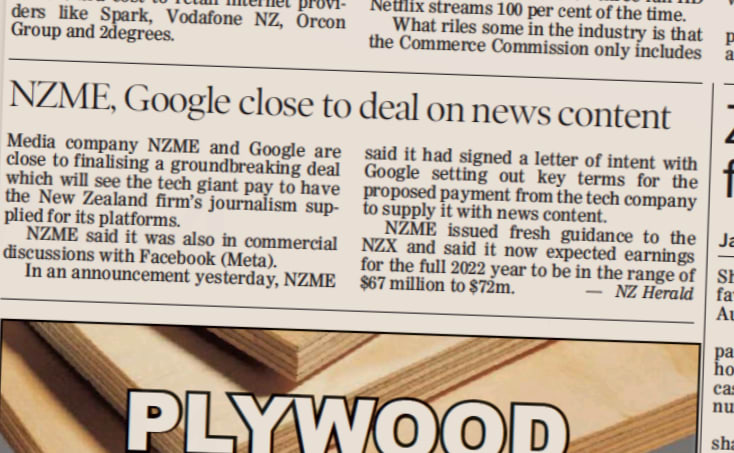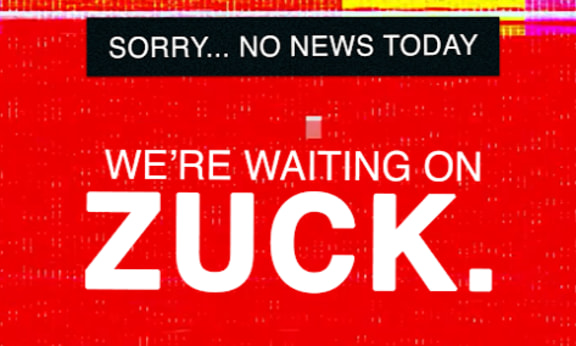Google and Facebook have distributed New Zealand media outlets' news online for years - for free. Local media companies joined forces last year in a bid to get them to pay for it. But one of the biggest - NZME - has now pulled the rug out from under it by doing its own deals.

Photo: photo / RNZ Mediawatch
After years of Facebook and Google making money from other outlets’ news - but contributing little to news journalism or to the tax take - Australia’s competition regulator the ACCC eventually concluded in 2017 the two titans of tech should be paying up.
Australia’s government then forced the issue: cough up or we’ll force you to by law, Facebook and Google were told.
“Both threatened to leave Australia. Facebook acted on that promise and pulled its new sites from Australia for about a week,” Prof Andrea Carson from Melbourne’s La Trobe University told Mediawatch last year.
Facebook and Google then began cutting confidential deals, some worth tens of millions of dollars, with the biggest news publishers across the Tasman one by one.
But small to medium-sized ones which didn't have as much clout missed out.
Last week around 30 of them published no news for a day in a protest targeting Facebook (and parent company Meta) which is holding out on payment for them.

Photo: supplied
Here the government hasn’t shown any willingness to confront Google and Facebook about their dominance of the NZ digital media marketplace.
Late last year our media took things into their own hands.
The News Publishers' Association - representing commercial news publishers - asked the Commerce Commission for permission to collectively bargain with Google and Meta.
Stuff, New Zealand Herald publisher NZME, Otago Daily Times publisher Allied Press and online outlet The Spinoff all backed the bid.
“We want to do it together so the deal benefits all organisations equally,” the founder and publisher of The Spinoff Duncan Greive said at the time in an explainer for his readers.
That would get around the problem of platforms picking and choosing, and minnows missing out, as in Australia.
RNZ and TVNZ later said they wanted in as well if such deals were to be done, but the News Publishers Association wasn’t keen on that.
The Ministry for Culture and Heritage also told the Commerce Commission they backed the idea because “offshore deals like the ones across the ditch proved news content has financial value to digital platforms. “
The big platforms didn’t see it that way,
Google told the Commerce Commission news media businesses get more value from Google than Google gets from their news content.
It said news-related inquiries accounted for less than 1.5% of Google searches in New Zealand in 2019.
Meta also told the Commerce Commission they didn’t want to deal collectively with media here.
In reply, the NPA said both of them were just trying to “prolong the status quo . . . in which the they benefit from their power.”
But deep in Google’s submission late last year Google revealed it was already negotiating with New Zealand news media businesses about including their content in Google News Showcase service.
Google said it had already reached agreement with two - and they were already getting paid.
Google said more commercial offers were on the table with “several other New Zealand news businesses”.
Last week NZME surprised the other companies in their collective effort by announcing it is doing its own deal with Google and negotiating with Meta.
NZME informed the NZ Stock Exchange it had already agreed to supply Google's News Showcase and the market could expect $5m more in profits next year.
NZME, me, me . . . ?
“Maybe that was a little bit of a sneaky move but I wasn't surprised that they've been negotiating with Google and Meta ,” Dr Merja Myllylahti from AUT - an expert in NZ media’s relationship with the big tech platforms - told Newstalk ZB last week.
The Press Gazette in the UK also noted NZME’s breakaway, reporting an unnamed rival as calling it “snaky”.
“This looks like it gives NZME $5m to go shopping for our journalists before we agree a deal,” the source told the Gazette.
Former newspaper editor Andrew Holden told RNZ’s Nine to Noon it was the lure of revenue now - rather than an unknown sum some time later was the incentive for NZME.
“My reading of it is that they want the cash sooner rather than later. It might take quite some months for the Commerce Commission to come back and give approval for it - or it might even fail,” said Holden.
“Here, they're able to go to the market and say: ‘Here's the amount of money, we're going to lift our profit . . . and our share price is going to increase.' It's the dollars that will drive so much of their behavior. ,” Holden told RNZ.
NZME told told Mediawatch it would not be appropriate for chief executive Michael Boggs to comment because confidential commercial negotiations are ongoing.
But it’s not just NZME’s business.
Their move pulls the rug out from under the collective effort for an agreement with big tech.
And the current chair of the NPA is none other than NZME’s chief executive Michael Boggs.
So would he talk to us on that basis?
That would be a conflict, NZME told Mediawatch.
NPA general manager Brook Cameron also declined to be interviewed during a “live regulatory process.”
But in a statement the NPA said it’s still pursuing authorisation from the Commerce Commission because of “the significant public benefits . . . . for local news media as a whole - in fair and reasonable remuneration.”
It remains to be seen if other companies backing the bid stick with it - or follow NZME’s lead and try to do their own deals.
If so, what’s playing out in Australia is likely to play out here - but without the context of a government forcing the issue.

